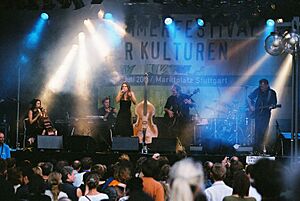Lhasa de Sela facts for kids
Quick facts for kids
Lhasa de Sela
|
|
|---|---|

Lhasa in Stuttgart in July 2005
|
|
| Background information | |
| Also known as | Lhasa |
| Born | September 27, 1972 Big Indian, New York, U.S. |
| Died | January 1, 2010 (aged 37) Montreal, Quebec, Canada |
| Genres | Folk, World |
| Occupation(s) | Singer-songwriter |
| Instruments | Vocals |
| Years active | 1985–2009 |
| Labels | Audiogram |
Lhasa de Sela (born September 27, 1972 – died January 1, 2010) was a talented singer and songwriter. Many people knew her simply as Lhasa. She was born in the United States but grew up in Mexico and the U.S. Later, she lived in Canada and France.
Her first album, called La Llorona, was very popular. It sold over 100,000 copies in Canada, earning a 'Platinum' award. Lhasa also won important music awards like the Félix Award and a Juno Award for it.
After this success, Lhasa toured with Lilith Fair, a music festival. She then joined her sisters in a French circus group. She sang for their shows, adding her unique voice to the music. Lhasa lived in Marseille, France, and started writing more songs there.
Later, she moved back to Montreal, Canada. There, she created her second album, The Living Road. She toured again to share her new music and worked with other musicians. In 2005, BBC Radio 3 named her the best world music artist from the Americas. Lhasa also wrote a book about her experiences traveling and performing.
Lhasa recorded a third album, titled Lhasa. Sadly, she was diagnosed with breast cancer in 2008. After 21 months of treatment, she passed away on New Year's Day in 2010. In 2012, a special concert was held in Montreal to remember her music. Many artists who had worked with her performed at this event.
Contents
Early Life and Musical Beginnings
Lhasa was born in Big Indian, New York. Her father, Alejandro "Alex" Sela, was a language teacher from Mexico. Her mother, Alexandra Karam, was a photographer and actress from the U.S. Lhasa said her parents didn't name her until she was five months old. Her mother was reading about Tibet, and the name Lhasa just felt right for her baby girl.
Lhasa's family was very musical. Her maternal grandmother, Elena Karam, was a famous actress. Her paternal grandmother, Carmen de Obarrio, was a pianist from Panama. Lhasa's great-grandfather, Basel, sang in six languages. Her mother played the harp, and her father played the flute.
For her first ten years, Lhasa lived and traveled across the United States and Mexico. She lived in a converted school bus with her parents and siblings. Her mother taught them at home. Both her parents spoke fluent Spanish, but Lhasa mostly spoke English. She learned Spanish during the eight years her family lived in Mexico. She listened to many different kinds of music, including songs by Chilean musician Victor Jara.
When Lhasa was 13, her parents separated. Lhasa, her mother, and her sisters settled in San Francisco. There, Lhasa began singing in a Greek cafe. She also studied Spanish in high school. After watching a documentary about the singer Billie Holiday, Lhasa decided she wanted to be a singer too.
In 1991, Lhasa visited her sisters in Montreal, Quebec, Canada. Her sisters were students at the National Circus School of Canada. Lhasa loved Montreal and decided to make it her home. She became interested in French culture. For five years, she sang in bars and worked with rock guitarist Yves Desrosiers.
In 1992, Denis Wolff, who managed a record company called Audiogram, saw Lhasa perform. She had a shaved head and was singing to a small crowd. He was very impressed by her personality, charm, and voice. Soon after, he signed her to his record label. With Yves Desrosiers, she created the songs for her first album.
A Career in Music
Audiogram released Lhasa's first album, La Llorona, in early 1997. Yves Desrosiers produced, arranged, and played on the album. This album was in Spanish. It mixed old Latin American songs from the 1930s and 1940s with new songs she wrote. The music was inspired by Mexican music, but also by klezmer (Jewish folk music), torch songs (sad love songs), gypsy jazz, and Middle Eastern music.
Lhasa said she enjoyed singing in Spanish, even though she didn't feel perfectly fluent. She felt it came from "a deeper place." The record company hoped the album would appeal to many people, not just Spanish speakers, because it sounded so unique.
La Llorona was first released in Quebec, Canada, on February 4, 1997. It came out in the U.S. two months later. A music video was made for her song "El Desierto." The album was a big success for Lhasa. She won the Quebec Félix Award in 1997 for "Best world music artist from Quebec." In 1998, she won a Canadian Juno Award for Best Global Artist. The album sold over 100,000 copies in Canada, earning a Platinum award. By 2003, it had sold 330,000 copies in France.

After touring in Europe and North America for several years, Lhasa moved to France in 1999. She joined her sisters in a circus and theater group called Pocheros. Lhasa sang in their show, "La Maison Autre" ("The Other House"). She lived in trailers with her sisters and traveled from place to place. Lhasa said it felt like her childhood.
She eventually settled in Marseille, where she started writing songs again. When she had enough new material, Lhasa returned to Montreal. There, she produced her second album, The Living Road, which was released in 2003. While La Llorona was all in Spanish, The Living Road had songs in English, French, and Spanish.
After The Living Road was released, Lhasa went on a two-year tour. She performed in 17 countries. Lhasa also worked with many other artists. She sang on the Tindersticks' song "Sometimes It Hurts." She also sang a duet with Tindersticks' singer Stuart Staples called "That Leaving Feeling." She appeared on albums by French singers Arthur H and Jérôme Minière, and the French gypsy music group Bratsch.
In 2005, BBC Radio 3 named her the best world music artist from the Americas. Her song "Anywhere On This Road" was featured on a special CD of award winners. The BBC praised the "alluring Arabic trumpet" on the song. A video for her song "Con toda palabra" was nominated for a Juno Award in 2006. In 2007, it won "Music Video of the Year" at the ION International Film Festival.
In 2008, Lhasa published a book in French called La Route chante (The Road sings). The book shares her thoughts and experiences from her life on the road with her sisters, her music, and her childhood.
Lhasa's third album, Lhasa, came out in April 2009 in Canada and Europe. Fewer musicians were involved in making this album. She recorded it while she was being treated for breast cancer. The last song on the album, "Anyone and Everyone," seemed to predict her future. It was written from the perspective of someone who knows death is near. Lhasa said the song was about finding inner happiness and feeling connected to the world. In May 2009, she also sang on the song "Wooden Arms" for Patrick Watson's album.
Because of her illness, Lhasa had to cancel a world tour that was planned for late 2009. She also put aside plans to make an album of songs by Chilean musicians Victor Jara and Violeta Parra.
Lhasa's Passing and Legacy
Lhasa fought breast cancer for 21 months. She passed away at her home in Montreal on January 1, 2010, at the age of 37. She was survived by her partner, Ryan Morey, her parents, and her nine siblings. Lhasa was cremated, as she wished. A funeral ceremony was held for her family and friends in Montreal on January 9. Her burial plot and stone are at Notre-Dame-des-Neiges Cemetery in Montreal.
After she passed away, it snowed in Montreal for four days. Patrick Watson, who worked with Lhasa, said some of her friends felt it was a final message from her. He co-wrote a song dedicated to Lhasa with the group Esmerine called "Snow Day for Lhasa."
On January 6, 2012, a sold-out memorial concert called "La Route chante: A Community Show for Lhasa" was held in Montreal. It honored Lhasa's life and music. Musicians who had worked with Lhasa performed, along with other artists like Katie Moore and Thomas Hellman. Lhasa's manager and Patrick Watson came up with the idea for the concert. Many musicians rehearsed together in Watson's studio.
To start the concert, the Barr Brothers played Lhasa's "Small Song" with other musicians. Other performers included Ariane Moffatt, Esmerine, Patrick Watson, Mario Légaré, Arthur H, Jérôme Minière, and Brazilian singer Bïa. A second show was added the next night because so many people wanted tickets.
On January 16, Jim Corcoran dedicated an episode of his CBC Radio One show, À Propos, to Lhasa. This show is about music from Quebec.
On June 21, 2010, another memorial ceremony took place in Bourgogne, France. Some of Lhasa's ashes were scattered in a small river that flows into the Mediterranean Sea.
In 2013, an audio documentary called She Moves Between Worlds: Remembering Lhasa de Sela was aired. It included a conversation between Lhasa and Madonna Hamel that had not been heard before. It also featured interviews with Lhasa's band members and friends.
In 2014, a park in her old neighborhood in Mile End, Montreal, was renamed to remember her.
Discography
Albums
- La Llorona (1997)
- The Living Road (2003)
- Lhasa (2009)
- Live in Reykjavik (2017)
Filmography
- El Desierto (1997)
- Con toda palabra (2005)
- Rising (2009)
- Cold Souls (2009)
See also
 In Spanish: Lhasa de Sela para niños
In Spanish: Lhasa de Sela para niños

